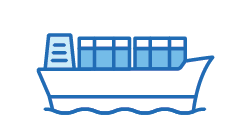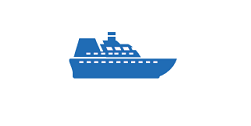Protecting Australia
The department manages biosecurity risks at the Australian border. We ensure international vessels arriving in Australian territory comply with International Health Regulations (IHR) and manage biosecurity risks for arrival.
Maritime conveyances (vessels) entering Australia could unknowingly carry unwanted pests and diseases, threatening our unique flora and fauna, aquaculture and agricultural industries as well as our human health.
Biosecurity risk of vessels is managed through pre-arrival reporting, assessment and inspection of international vessels arriving in Australia. For the entire time the vessel is in Australian waters, vessels must report:
- the human health of travellers
- crew changes
- animals on board
- hitchhiking animals and birds
- plant and insect pests
- ballast water and biofouling
- waste management, including recycling where applicable.
Conveyance Maritime Team email:
Biosecurity reporting obligations
Vessel Operator Responsibilities
The operator of a vessel is obligated to accurately report information in accordance with Section 193 of the Biosecurity Act 2015.
Shipping Agent Responsibilities
Where a vessel operator uses a shipping agent, the agent is responsible for lodgment of accurate and timely pre-arrival reporting (PAR).
The agent must ensure that this information is a true and correct representation of the reports provided by the vessel operator, and that any changes have been confirmed with the operator.
Pre-arrival information, and changes, for vessels must be reported in a method approved by the Director of Biosecurity.
For commercials, reporting obligations are met once vessel pre-arrival information has been submitted in the Maritime and Aircraft Reporting System (MARS). Electronic offline forms can be used where there is limited internet connectivity, but they do not constitute the approved form until the PAR has been submitted in MARS.
Pre-arrival reporting must be reported 96 to 12 hours prior to arrival in Australian waters.
Pre-arrival reporting ensures that the biosecurity risk of each vessel entering Australian waters is assessed and managed. Where vessel reporting does not meet the department‘s standards additional directions or corrective actions will be issued by a biosecurity officer.
Any changes in circumstances during the voyage in Australian waters must also be reported to the department as soon as practicable.
In addition to department requirements, Australian state and territory governments also have biosecurity requirements.
Biosecurity legislation and the Australian Territory
The range of the Australian territory and its external territories.
Where in Australia can you arrive?
Vessels can only arrive at Australian ports approved by the department.
Commercial vessels

Commercial vessel types that must report using MARS on pre-arrival to Australia.
Maritime and Aircraft Reporting System (MARS)
How to access MARS to report commercial vessel pre-arrival and receive biosecurity directions for arrival.
Non-commercial vessels
What are your pre-arrival reporting obligations and what to expect for your non-commercial vessel (yacht) arrival in Australia.
Preparing your non-commercial vessel for biosecurity clearance
Australian registered vessels
Are you an Australian vessel travelling within Australian territories?
Offshore installations
What are your reporting obligations for vessels or aircraft that move between an installation and Australian ports
Preparing your offshore installation for biosecurity clearance
Military vessels
All military vessels arriving in Australia must undergo a routine vessel inspection by a biosecurity officer at their first point of entry into Australian territory (unless invoking sovereign immunity).
Fees and charges
The department charges for activities it undertakes to protect Australia’s biosecurity. A full list of fees associated with vessel biosecurity services are set out in the department’s charging guidelines.
Compliance and Enforcement
Under section 532 of the Biosecurity Act, a person is liable to a civil penalty for false or misleading information, or omission of any matter, or thing, without which the information is misleading.
Failure to comply with a requirement under the Act may result in penalties, including infringement notices, civil penalties or criminal prosecutions.
See also Reportable biosecurity incidents.
Need help with vessel reporting?
The department’s National Maritime Centre (NMC) provides national support.
See Vessel Contacts for the key biosecurity offices, and on-call contact arrangements at each port location across Australia.
Learn about ongoing heightened biosecurity measures and surveillance
Foot and mouth disease – What to look for Foot and mouth disease - DAFF and Measures to prevent the introduction of foot and mouth disease into Australia
Burnt Pine Longicorn (BPL) – increased seasonal risk between November and May each year: Burnt pine longicorn beetle - person in charge questionnaire and statement
African swine fever – travellers must not remove jerky, biltong and other pork products from the vessel: Keeping African swine fever out of Australia


